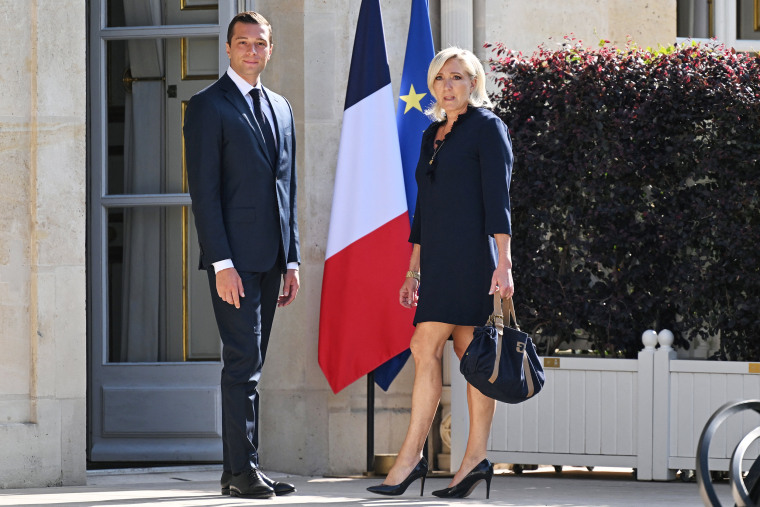Marine Le Pen has for years been a superstar of Europe’s far-right movement. That was until this week, when a spectacular court ruling banned her from running in France’s 2027 presidential election — a vote she looked well placed to win.
Now, the future looks difficult for Le Pen, 56, who was found guilty of running a “system” of embezzlement that siphoned $3.4 million of European Union funds to her National Rally party.
The implications are also unclear for her party and the wider European far-right movement, which has won friends in President Donald Trump’s White House.
Just like Trump in the United States, Le Pen has attacked the French legal system, condemning the ruling as a rigged attempt to block her from power. Those comments are a marked departure from her years of efforts to become a respected, mainstream force in European politics.
The National Rally leader has vowed to appeal her five-year election ban and two-year suspended prison sentence, plus another two with an electronic ankle tag. She was among two dozen defendants from her party.
But this is “the kind of obstacle you don’t hop over just by a publicity campaign or ignoring it,” said Cécile Alduy, a French studies professor at Stanford University.
Some opponents fear that like Trump, the sentence will beatify her as a martyr with her supporters. She has already urged the “millions of people” outraged to protest.
The establishment “brought out the nuclear bomb,” Le Pen told the French Parliament on Tuesday. “And if it is using such a powerful weapon against us, it’s obviously because we’re about to win the elections.”
Trump was quick to draw parallels with his own situation.
“She was banned for running for five years and she’s the leading candidate — that sounds like this country,” he told journalists Tuesday in the Oval Office. “That’s a very big deal.”
Meanwhile, Trump adviser Elon Musk said it was an example of “the radical left” abusing “the legal system to jail their opponents” when its members can’t win elections. “This is their standard playbook throughout the world,” he wrote on X.
Trump was convicted last year of falsifying business records related to a hush money payment made to adult film star Stormy Daniels during the 2016 election.
Neither Trump nor Musk offered evidence of French impropriety, and far from “the radical left,” France is governed by President Emmanuel Macron and his centrist-led alliance.
Still, facts may not dilute the potency of those populist critiques.
Far-right leaders such as Hungarian Prime Minister Viktor Orbán and Dutch anti-Islam firebrand Geert Wilders have this week voiced support for Le Pen’s cause. Dmitry Peskov, spokesman for Russian President Vladimir Putin, called it “a violation of democratic norms.”
That Le Pen was leading the field is undeniable, after softening her party’s hard-line image while retaining its staunchly anti-immigration ideology.
An Ifop poll taken four days before her sentencing projected she would get 36% of the vote in 2027. The two-term Macron is ineligible for a third but his ally, Édouard Philippe was second on 25%.
Le Pen is far from the first high-profile French politician to face legal troubles, with former Presidents Jacques Chirac and Nicolas Sarkozy both being convicted of corruption.
If she fails in appealing her disbarment, she has a protégé and heir-apparent in Jordan Bardella, 29, the millennial darling of the far right with a bootstrap backstory of growing up with Italian-Algerian heritage in Paris’ grittier suburbs.

With 2 million TikTok followers, he became the party’s president at 26 and its first not born a Le Pen. He is deeply loyal, and was poised to become Le Pen’s prime minister if she won in 2027.
But his mentor’s conviction “might lead to a change in plans,” according to Tara Varma, a visiting fellow at Washington’s Brookings Institution think tank.
Le Pen acknowledged as much in an interview with French television Tuesday, saying Bardella might have to be deployed to run for the top job “sooner than necessary.”
A survey by the pollster Harris Interactive the day of Le Pen’s sentencing put her and Bardella’s popularity on equal footing, but his rise is not a fait accompli, analysts say.
“A lot of internal fights are likely to emerge,” said Alduy at Stanford. And Bardella’s “leadership will be put into question by Marine’s allies.”
His debating and media skills “pale in comparison” to Le Pen’s “steady bulldozer-like calm,” she added. “It’s unclear that at 29 years old he is cut for the role.”
Another potential successor is Le Pen’s niece, Marion Maréchal, who dropped the family name in 2018. Some commentators said that was an attempt to distance herself from her late grandfather and Le Pen’s father, Jean-Marie Le Pen, though she denied it.
The senior Le Pen founded the National Front, as National Rally was then known, but his daughter later kicked him out in her own attempt to distance the party from his record of racist remarks and Holocaust denial.
Maréchal still “carries the Le Pen name” in spirit at least, said Varma, and would continue a lineage unbroken since the 1970s.
Ultimately, the only certain outcome from this week’s events for French politics is more drama.
After inconclusive snap elections last year, Macron has cobbled together a fragile coalition which could soon face fresh no-confidence votes from Le Pen, who is still a lawmaker, Alduy said.
Another governmental collapse — there were two last year — is not impossible. If that happens, Alduy added, “more chaos is certainly in store on all sides.”








Recent Comments